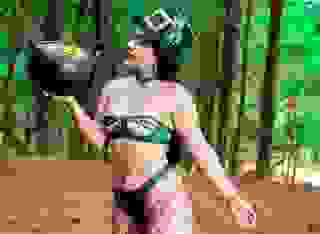- How To
- Parts of Speech Pt. 01
Note: You can change font size, font face, and turn on dark mode by clicking the "A" icon tab in the Story Info Box.
You can temporarily switch back to a Classic Literotica® experience during our ongoing public Beta testing. Please consider leaving feedback on issues you experience or suggest improvements.
Click hereVELVET'S LAWS OF WRITINGPART 01: NOUNS AND VERBS
By VelvetPie
Omit needless words. Vigorous writing is concise. A sentence should contain no unnecessary words, a paragraph no unnecessary sentences, for the same reason that a drawing should have no unnecessary lines and a machine no unnecessary parts.
--William Strunk, Jr.
For anyone trying to learn the art of writing, William Strunk's words may seem easy but for those of us who have been practicing this art, it can sometimes seem an impossible task. By reading the works of other authors and constantly seeking to educate ourselves can we become better writers. In reading some of the works of others on this site, I have noticed quite a few common grammatical mistakes that bring the loveliest and most interesting stories low.
Everyone makes mistakes and this is my sincere attempt to aid beginners as well as advanced writers in correcting some of the more common grammatical mistakes that occur everyday.
* * * * *
PARTS OF SPEECH
There are eight parts of speech: nouns, verbs, pronouns, adjectives, adverbs, prepositions, conjunctions and interjections.
NOUNS
According the Schoolhouse Rock (and our English teachers), a noun is a person, place or thing, but there are also different types of nouns. Common, proper, count ... well, let's take them one at a time.
Common nouns are just anything you can imagine and here are some examples: peacock, apple, mother, car. Some of these can also be calledcount nouns if they have singular and plural forms, such as apple and its plural form, apples.Non-count nouns have no plural forms and don't add an –S on the end. A few examples are homework and typing.
Aproper noun is a noun that is capitalized to indicate a specific title or name, such as Mary orCaptain John.
Concrete nouns are things that physically exist, such as car, telephone or table. Anabstract noun gives a name to a quality, idea or characteristic such as failure or goodness. Finally,compound nouns are composed of more than one word, such as living room or grocery bag.
The last group of nouns are used but not widely classified. Acollective noun names a group such as sheep or group. In some cases, it can be made plural but the singular word signifies more than one of the object. Amass noun is something that can not be counted. Examples of these nouns would be water or gasoline.
VERBS
A verb is a word that shows action. It can also be described as a word that shows movement or time. Verbs also have atense which tells when the events take place. Tenses such as present, past and future and are broken down into simple, perfect, continuous and perfect continuous. Continuous and Perfect Continuous are also considered asprogressive verbs. You won't hear people walking around naming the tenses but if you take a language, you will also have to learn these. Some verbs can also becount verbs.
Some common tenses and examples: using the word MOVE with HE/SHE as the pronoun. Keep in mind that the words are dependent on the pronoun used. For example, when using I as the pronoun, the PRESENT SIMPLE tense would be I MOVE as opposed to HE MOVES.
Simple
Present – MOVES (a same action that is taking place and may happen again in the future)
Past – MOVED (an action that has already taken place and will not happen again)
Future – WILL MOVE (an action that will happen in the future)
Perfect
Present Perfect – HAS MOVED (an action that has already taken place in the past and may happen again in the future or to show how long something has occurred)
Past Perfect – HAD MOVED (an action that took place in the past before another event)
Future Perfect – WILL HAVE MOVED (an action that has not happened yet but will happen within a specified amount of time)
Continuous
Present Continuous – IS MOVING (an action that is happening right now)
Past Continuous – WAS MOVING (an action that was happening when something else occurred)
Future Continuous – WILL BE MOVING (an action that will be happening when something else happens)
Perfect Continuous
Present Perfect Continuous – HAVE BEEN MOVING (an action that has been happening and will continue to happen)
Past Perfect Continuous – HAD BEEN MOVING (an action that shows how long something had been happening before something else occurred)
Future Perfect Continuous – WILL HAVE BEEN MOVING (an action that shows how long something will have been happening by a specified time in the future)








